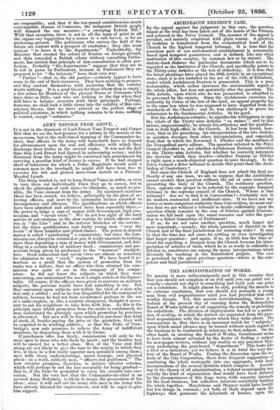ARCHDEACON DEN SON'S CASE.
By the appeal against the judgment in this case, the question raised at the trial has been taken out of the hands of the Primate and referred to the Privy Council. The manner of the appeal is peculiar, and scarcely consistent with plain reason. A question of doctrine is transferred from the ecclesiastical head of the Church to the highest temporal tribunal. It is true that the mundane part of our secelesmatical establishment is necessarily based upon temporal guarantees, and is defined, like any other institution of this country, by common law or by statute. The statute-book dictates the particular documents which are to be regarded as the institutes of the Church, and specifically points to the Thirty-nine Articles as the test of orthodoxy. It is true that the latest pleadings have placed the 29th Article in an exceptional state, since it is not included in the act of the 13th of Elizabeth, under which Archdeacon Denison is prosecuted. This is a pure technicality, which rather increases the unreasonable aspect of the whole affair, but does not materially alter the question. The 28th Article, upon which also he was prosecuted, is admitted to be governed by the statute. Since the Archdeacon exercises his authority by virtue of the law of the land, an appeal properly lay to the same law when he was supposed to have departed from the standards of the Church ; and he was challenged to prove his submission to the fundamental Articles. So far good. But the Archdeacon submits ; he signifies his willingness to sign the whole of the Thirty-nine Articles " ex animo "- and to that extent, unquestionably, he attests his orthodoxy and his qualifica- tion to hold high office in the Church. It has been found, how- ever, that in his preaching, his interpretation of the two Articles in question diverges from other interpretations, and especially from that to which the Reverend J. Ditcher and the members of the Evangelical party adhere. The question referred to the Privy Council therefore is, not whether Archdeacon Denison subscribes to the Thirty-nine Articles, but whether he correctly interprets the doctrine which they involve—whether Denison or Ditcher is right upon a much-disputed question in pure theology. Is the Privy Council a fitter tribunal to decide that point than the Arch- bishop of Canterbury ? But since the Church of England does not admit the final au- thority of any one man, we are to suppose that the Archbishop cannot answer that question without the aid of some council re- presenting the body of the Church. The residuary question, then, appears one proper to be referred by the supreme temporal tribunal to the supreme council of the Church. Where is that tribunal ? Are we to find it in Convocation- ?—Certainly not, in its modern contracted and inefficient state. If we have not any better or more competent authority than Convocation, we must con- fess that we are without a tribunal to decide sufficiently upon the question which remains in the case of Ditcher against Denison ; unless we fall back upon the usual resource and refer the ques- tion to a Select Committee of Parliament !
If so, do we not raise another question, much larger and
more importa4t,—namely, the whole question of disorder in the Church and of the final jurisdiction for restoring order ? It may be that the time has not come for settling or even investigating that larger question; and again, if so, as little has the time ar- rived for expelling a Denison from the Church because his inter- pretation of articles of faith, which he is as ready to subscribe as Ditcher is, constitutes one among the many interpretations which diversify the teaching in the Established pulpits. The case is governed by the great previous question—where is the com- petent and final jurisdiction ?


























 Previous page
Previous page